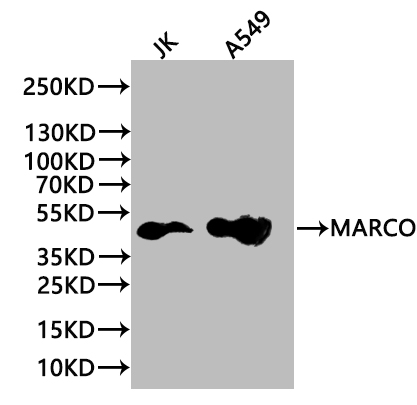Full Product Name
Rabbit anti-Homo sapiens (Human) MARCO Polyclonal antibody
Alternative Names
AI323439 antibody; Ly112 antibody; Macrophage receptor MARCO antibody; Macrophage receptor with collagenous structure antibody; Marco antibody; MARCO_HUMAN antibody; SCARA2 antibody; Scavenger receptor class A member 2 antibody
Immunogen
Recombinant Human Macrophage receptor MARCO protein (421-520AA)
Immunogen Species
Homo sapiens (Human)
Purification Method
Antigen Affinity Purified
Concentration
It differs from different batches. Please contact us to confirm it.
Buffer
Preservative: 0.03% Proclin 300 Constituents: 50% Glycerol, 0.01M PBS, PH 7.4
Tested Applications
ELISA, WB
Recommended Dilution
| Application |
Recommended Dilution |
| WB |
1:1000-1:5000 |
Storage
Upon receipt, store at -20°C or -80°C. Avoid repeated freeze.
Lead Time
Basically, we can dispatch the products out in 1-3 working days after receiving your orders. Delivery time maybe differs from different purchasing way or location, please kindly consult your local distributors for specific delivery time.
Description
The MARCO antibody was inducibly expressed in a rabbit and the immunogen is the recombinant human MARCO protein (421-520aa). It was purified through antigen affinity chromatography.
The MARCO polyclonal antibody has been validated for its specificity in ELISA, WB, and IHC applications. It can be used for the detection and investigation of human MARCO protein expression in different experiments. MARCO, a scavenger receptor expressed by macrophages and dendritic cells, mainly recognizes and binds to PAMPs thus triggering the immune response resulting in the phagocytosis and destruction of the invading microorganisms by the immune cells.
Usage
For Research Use Only. Not for use in diagnostic or therapeutic procedures.






